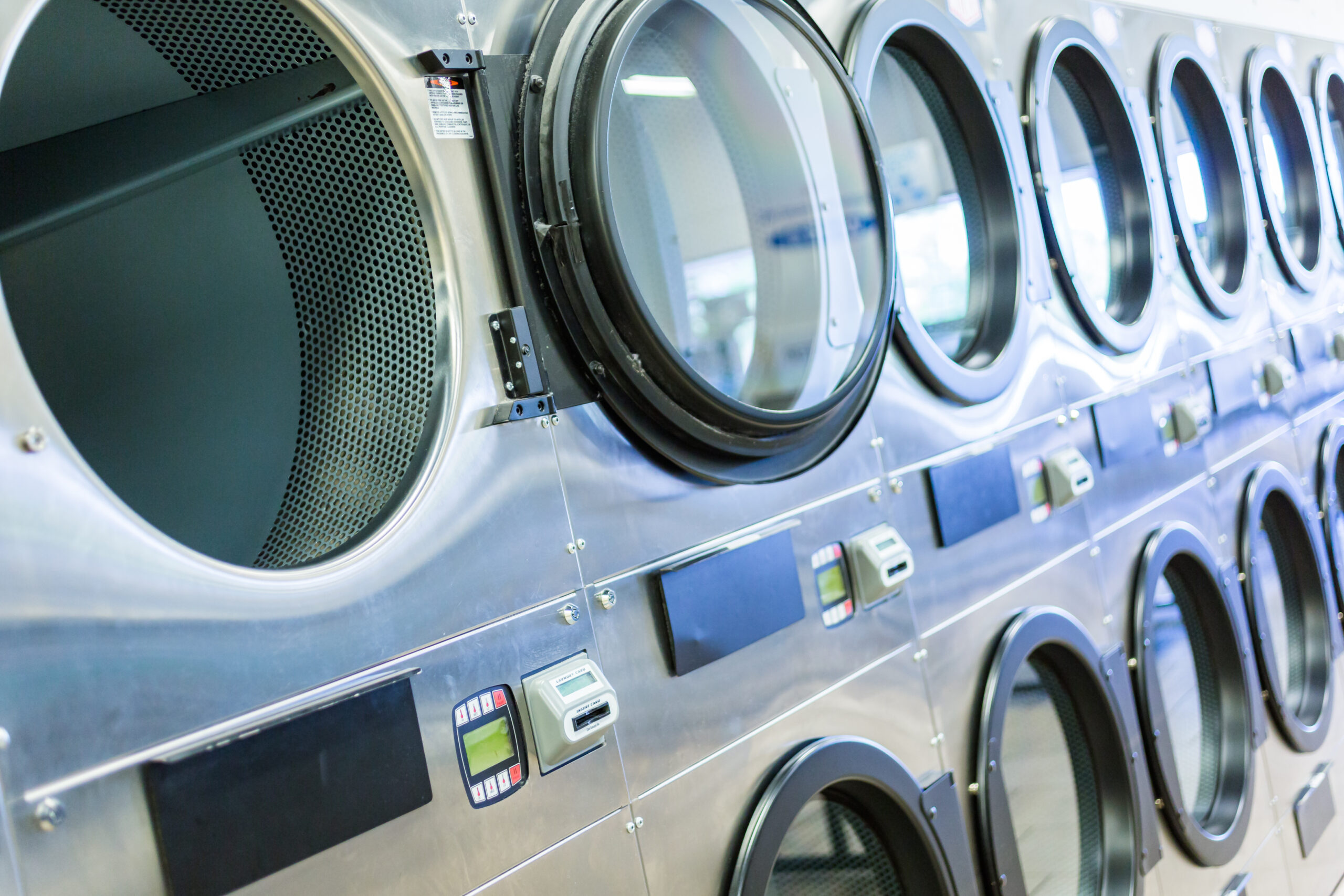In today’s fast-paced world, efficiency and automation are no longer luxuries—they are necessities. The laundry industry is no exception. Whether managing a laundromat, on-premise laundry facility, or a commercial laundry business, adopting a Laundry Management System (LMS) can significantly streamline operations, enhance customer satisfaction, and increase profitability.
Laundry businesses today face growing pressure to increase efficiency, reduce labor costs, and improve the customer experience. A Laundry Management System (LMS) is a technology solution that helps meet these demands by automating key operations. Whether operating a laundromat, hotel laundry room, or industrial facility, owners benefit from streamlined workflows and greater visibility. Customers also gain access to faster service, mobile payments, and real-time machine updates. These systems are becoming standard in the industry as operators seek more control and reliability. With accurate data and automation, laundry businesses can scale operations without compromising service quality.
What Is a Laundry Management System?
A Laundry Management System is a software platform designed to automate and optimize the operations of a laundry business. It combines hardware (like payment kiosks, smart washers, and POS systems) with cloud-based or on-premise software to provide end-to-end control over laundry operations, from customer check-in to order tracking, payment processing, machine monitoring, reporting, and inventory management.
A Laundry Management System is a combination of software and hardware tools designed to monitor, automate, and optimize laundry operations. These platforms allow business owners to manage machines, employees, payments, orders, and inventory from a single dashboard. Most systems also support cloud connectivity, allowing for remote management across multiple locations. Laundry facilities that handle high volumes can use LMS tools to eliminate bottlenecks and reduce errors. Customers benefit from features like text alerts, cashless payment, and machine reservations. The system acts as the digital backbone of a modern laundry business.
Core Features of a Laundry Management System
- Point of Sale (POS) Integration
LMS platforms often include built-in POS capabilities or integrate with third-party POS systems, enabling quick transactions, loyalty programs, and digital receipts. POS integration is one of the most important features of any Laundry Management System. It enables seamless transactions using credit cards, mobile wallets, or loyalty programs. The system records all sales, allowing for real-time tracking and reconciliation. Staff can process drop-off orders quickly with barcode scanning and digital receipts. Customers appreciate the speed and convenience of modern payment systems. Business owners can also track popular services and optimize pricing based on usage trends. - Smart Machine Control
With IoT-enabled washers and dryers, business owners can monitor machine status in real-time, track usage, detect malfunctions, and control operations remotely. Smart machine control gives operators real-time access to the status and performance of washers and dryers. With connected machines, owners can track usage, receive maintenance alerts, and troubleshoot issues remotely. The system can shut down malfunctioning units or schedule service without delay. Businesses save time and money by preventing downtime and optimizing energy consumption. Customers also benefit from knowing which machines are available before arriving. This technology improves both efficiency and service reliability. - Customer Self-Service Portals
Many systems offer customer apps or kiosks where users can pay via mobile wallets, check machine availability, track wash cycles, and receive notifications when their laundry is done. Many Laundry Management Systems offer mobile apps or kiosks that allow customers to manage their laundry experience independently. These portals let users check machine availability, start or reserve cycles, and receive alerts when their laundry is done. Customers can also reload accounts, track usage, and join loyalty programs. This self-service model reduces the need for staff intervention while improving convenience. It appeals to tech-savvy customers who expect digital options. A seamless experience encourages repeat business and stronger customer satisfaction. - Order & Pickup Tracking
For drop-off or commercial laundry services, LMS platforms provide barcode-based tagging systems to track orders through various stages—wash, dry, fold, delivery. For commercial or drop-off laundry services, accurate tracking is essential. Laundry Management Systems use barcode or RFID technology to follow items through each stage of the cleaning process. Customers can view the status of their order and receive notifications when it’s ready. Staff can easily manage pickup schedules, delivery routes, and order history. Mistakes and lost items are reduced because everything is logged and traceable. This level of visibility builds trust and improves efficiency. - Inventory Management
For hotels, hospitals, and uniform services, tracking linens or garments is vital. A good LMS ensures accurate inventory tracking, automatic stock level alerts, and history logs. Inventory management is critical in hospitality, healthcare, and commercial laundry settings. A Laundry Management System helps track linens, uniforms, or customer items in real time. Managers can monitor stock levels, flag shortages, and automate reordering. Accurate logs help prevent loss, overuse, or unauthorized removal of items. The system also maintains usage history for compliance or reporting purposes. Better inventory control leads to cost savings and smoother operations. - Employee Access Controls
Staff permissions can be managed by role, helping business owners maintain oversight while assigning operational responsibilities to team members. LMS platforms allow for customized user roles and access permissions to protect sensitive data and maintain operational control. Employees can be given access only to the tools they need, such as check-ins, machine management, or reporting. Managers can monitor employee activity, track performance, and audit changes made in the system. This reduces risk and increases accountability across the team. Training is easier because each role has a simplified interface. A secure system ensures smooth workflows with fewer mistakes. - Reporting and Analytics
Real-time dashboards and downloadable reports provide data on revenue, machine utilization, peak hours, customer behavior, and more. Data is a powerful asset for any business, and LMS platforms provide detailed reporting tools. Owners can view daily revenue, machine usage, peak hours, and service performance at a glance. Historical data reveals trends that can inform staffing, pricing, or equipment upgrades. Reports can be filtered by location, time, or customer segment. This helps operators make smarter decisions without guessing. With better insights, the business can respond quickly to changes in demand or customer behavior.
Benefits of a Laundry Management System
1. Operational Efficiency
Automation reduces manual errors, cuts down labor time, and ensures processes are executed consistently across shifts and locations.
Automation cuts down on manual tasks and repetitive work, saving time for staff and management. Machines can be monitored remotely, payments are processed instantly, and reports are generated automatically. This allows employees to focus on customer service and problem-solving. Scheduling maintenance or ordering supplies becomes easier with system alerts. Overall, the operation runs smoother with fewer errors and delays. These gains directly contribute to higher profitability and customer satisfaction.
2. Enhanced Customer Experience
Customers benefit from faster service, digital payments, machine availability tracking, and loyalty incentives—all of which encourage repeat business.
Customers today expect more than just clean clothes—they want speed, transparency, and convenience. LMS tools offer features like real-time notifications, mobile payments, and loyalty rewards that improve the user experience. Kiosks or apps make the check-in process quick and contactless. Clear updates about machine status or order progress reduce frustration and waiting. Positive experiences lead to better reviews, more referrals, and increased retention. The customer benefits align directly with business goals.
3. Better Resource Management
From machine scheduling to chemical usage tracking, LMS tools help optimize resources, reduce waste, and extend equipment lifespan.
Resource efficiency is key to lowering costs and staying competitive in the laundry business. Laundry Management Systems help operators monitor water, detergent, and energy usage across machines. This data enables better planning and reduces waste. Maintenance needs are flagged early to avoid expensive breakdowns. Employees are scheduled more effectively based on real demand. Over time, these tools reduce operating expenses and improve sustainability.
4. Increased Revenue
Upsell services like express washing or premium detergents can be easily integrated into the checkout process, while marketing tools help boost return visits.
By automating upsells and improving service offerings, LMS tools help drive more revenue. Premium services like express wash, scented detergents, or garment pressing can be added to the checkout process. Promotions and loyalty discounts are easy to manage and track. Data insights help identify which services are most profitable. Faster turnaround times and fewer errors reduce refund requests. These improvements contribute directly to a healthier bottom line.
5. Centralized Control for Multi-Location Operators
For businesses managing several laundromats or service locations, a cloud-based LMS offers centralized oversight, consistent branding, and scalable operations.
Operators managing multiple laundromats or service locations benefit from centralized dashboards. A Laundry Management System allows them to oversee all sites from one interface. Standardizing processes and pricing is easier with remote control tools. Issues at one location can be addressed without being on-site. Reports across all sites can be compared to find performance gaps. This level of visibility supports growth and consistent brand quality.
Future of Laundry Management: AI, Data, and Sustainability
Modern LMS platforms are now integrating artificial intelligence and machine learning to forecast demand, predict machine maintenance, and optimize staffing. Sustainability features such as water and energy consumption tracking are also becoming standard, helping laundry businesses meet ESG goals and reduce operational costs.
Emerging technologies are enhancing Laundry Management Systems in new and exciting ways. Artificial intelligence can predict peak hours, detect usage anomalies, and suggest preventive maintenance. Machine learning helps improve staff schedules and optimize service menus. Some systems now track water and energy consumption for sustainability reporting. Cloud platforms allow for instant updates and remote control features. As customer expectations evolve, these innovations ensure laundry businesses stay ahead.
Conclusion
A Laundry Management System is more than just software—it’s a strategic investment in automation, data-driven decision-making, and customer satisfaction. As the laundry industry continues to modernize, businesses that adopt comprehensive LMS solutions will be better positioned to scale, compete, and thrive in an increasingly digital world.
Laundry Management Systems are changing how laundry businesses operate at every level. From automated payments to real-time machine monitoring, these platforms deliver convenience, control, and insight. Businesses that invest in LMS tools are better positioned to grow and compete. Customers enjoy a faster, smoother experience that builds loyalty over time. By embracing technology, operators can reduce stress, boost profits, and deliver better results. The future of laundry is smart, and it’s already here.



